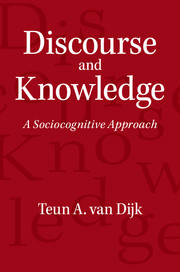Book contents
- Frontmatter
- Contents
- List of figures
- List of tables
- Acknowledgment
- 1 Introduction
- 2 Elements of a theory of natural knowledge
- 3 Discourse, knowledge and cognition
- 4 Discourse, knowledge and social cognition
- 5 Discourse, knowledge and society
- 6 Discourse, knowledge and culture
- 7 Language, discourse and knowledge
- 8 Conclusions
- References
- Index
7 - Language, discourse and knowledge
Published online by Cambridge University Press: 05 August 2014
- Frontmatter
- Contents
- List of figures
- List of tables
- Acknowledgment
- 1 Introduction
- 2 Elements of a theory of natural knowledge
- 3 Discourse, knowledge and cognition
- 4 Discourse, knowledge and social cognition
- 5 Discourse, knowledge and society
- 6 Discourse, knowledge and culture
- 7 Language, discourse and knowledge
- 8 Conclusions
- References
- Index
Summary
Introduction
After studying the relationships between discourse and knowledge in philosophy, psychology, sociology and anthropology in the previous chapters, this chapter focuses on the linguistic and discourse analytical study of these relationships.
Linguistics and discourse studies traditionally dealt only marginally with knowledge and focused especially on grammar and the study of the structures of discourse and conversation. Yet, some topics in linguistics, often at the boundary of discourse analysis, at least indirectly paid attention to ‘information’ and knowledge, as is the case for the study of topic and focus, evidentiality, epistemic modality and presupposition. In this chapter we shall only briefly summarize some of this research because there are now many studies about these topics. Rather, we shall take a broader, more discourse analytical and integrated approach of the epistemic structures of discourse (see, e.g., Chafe, 1972, for an early study of knowledge in linguistics).
In conversation analysis, still little given to cognitive studies, knowledge is now being studied in normative and moral terms of the epistemic access, primacy and responsibility of participants in interaction, such as who has rights to tell a story in a conversation, for instance because of more direct access to the events.
Beyond grammar, classical speech act theory formulated the appropriateness conditions of such speech acts as assertions and questions in terms of the (lack of) knowledge of the participants. We have already seen that such appropriateness conditions can more adequately be formulated in terms of context models controlling the production and comprehension of text and talk.
Finally, discourse and communication studies have paid attention to the way knowledge is spread in popularization discourse. In this chapter, we shall therefore focus also on the ways discourse structures beyond the sentence level are related to the expression and communication of knowledge.
- Type
- Chapter
- Information
- Discourse and KnowledgeA Sociocognitive Approach, pp. 222 - 309Publisher: Cambridge University PressPrint publication year: 2014



